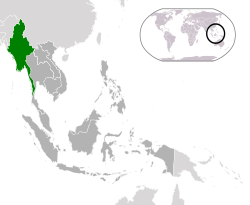Post-independence Burma, 1948–62
| Union of Burma | ||||||||||
|
ပြည်ထောင်စု မြန်မာနိုင်ငံတော် Pyidaunzu Myăma Nainngandaw |
||||||||||
|
||||||||||
|
||||||||||
|
Anthem Kaba Ma Kyei Till the End of the World |
||||||||||
| Capital | Rangoon | |||||||||
| Languages | Burmese | |||||||||
| Religion | Buddhism | |||||||||
| Government | Parliamentary republic | |||||||||
| President | ||||||||||
| • | 1948–1952 | Sao Shwe Thaik | ||||||||
| • | 1952–1957 | Ba U | ||||||||
| • | 1957–1962 | Win Maung | ||||||||
| Prime minister | ||||||||||
| • | 1948–1956, 1957–1958, 1960–1962 | U Nu | ||||||||
| • | 1956–1957 | Ba Swe | ||||||||
| • | 1958–1960 | Ne Win | ||||||||
| Historical era | Cold War | |||||||||
| • | Established | 4 January 1948 | ||||||||
| • | Disestablished | 2 March 1962 | ||||||||
| Area | ||||||||||
| • | 1948 | 676,578 km² (261,228 sq mi) | ||||||||
| Currency | Kyat | |||||||||
|
||||||||||
| Today part of |
|
|||||||||
During the first years of Post-independence Burma, insurgencies by the Red Flag Communists led by Thakin Soe, the White Flag Communists led by Thakin Than Tun, the Yèbaw Hpyu (White-band PVO) led by Bo La Yaung, a member of the Thirty Comrades, army rebels calling themselves the Revolutionary Burma Army (RBA) led by communist officers Bo Zeya, Bo Yan Aung and Bo Yè Htut - all three of them members of the Thirty Comrades, Arakanese, and the Karen National Union (KNU).
Remote areas of northern Burma were for many years controlled by an army of Kuomintang (KMT) forces after the Communist victory in China in 1949. Burma accepted foreign assistance in rebuilding the country in these early years, but continued American support for the Chinese Nationalist military presence in Burma finally resulted in the country rejecting most foreign aid, refusing to join the South-East Asia Treaty Organisation (SEATO) and supporting the Bandung Conference of 1955. Burma generally strove to be impartial in world affairs and was one of the first countries in the world to recognise Israel and the People's Republic of China.
By 1958, the country was largely beginning to recover economically, but was beginning to fall apart politically due to a split in the AFPFL into two factions, one led by Thakins Nu and Tin, the other by Ba Swe and Kyaw Nyein. And this despite the unexpected success of U Nu's 'Arms for Democracy' offer taken up by U Seinda in the Arakan, the Pa-o, some Mon and Shan groups, but more significantly by the PVO surrendering their arms. The situation became very unstable in parliament, with U Nu surviving a no-confidence vote only with the support of the opposition National United Front (NUF), believed to have 'cryptocommunists' amongst them.
...
Wikipedia



